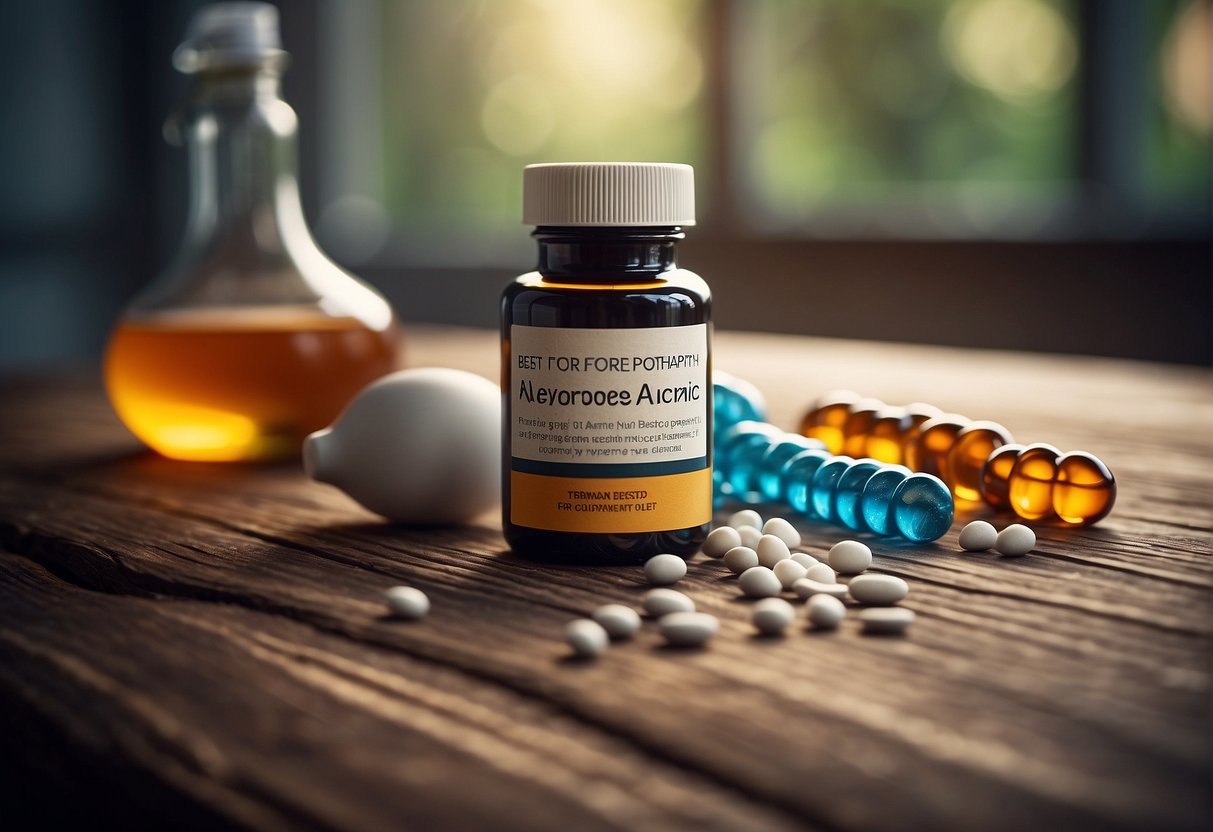Neuropathy, characterized by nerve damage that can lead to symptoms like pain, weakness, and numbness, primarily affects the peripheral nerves. While there are various treatments for neuropathy, the role of dietary supplements in managing this condition has garnered attention. Supplements are considered by many as a way to support nerve health, potentially reducing symptoms and improving quality of life for those affected.
Understanding which supplements may benefit neuropathy involves looking at those that contribute to nerve repair, maintenance, or symptom relief. Essential vitamins like B12 and D, certain amino acids, minerals such as magnesium, omega-3 fatty acids, and various antioxidants are often recommended for their potential nerve-supportive properties. However, it is crucial to approach supplementation with evidence-based knowledge to avoid ineffective or even harmful intake.
Key Takeaways
- Supplements can support nerve health and potentially alleviate neuropathy symptoms.
- Choosing the right supplements should be based on scientific evidence and individual health needs.
- Consulting with a healthcare provider is crucial before starting any new supplement regimen.
Understanding Neuropathy
Neuropathy encompasses a range of medical conditions resulting from damage to the peripheral nerves. These nerves are critical in sending messages from the brain and spinal cord to the rest of the body.
Symptoms vary but may include:
- Numbness
- Tingling sensations
- Muscle weakness
- Pain
- Sensitivity to touch
Causes of neuropathy can be diverse:
- Diabetes mellitus
- Vitamin deficiencies
- Infections
- Autoimmune diseases
- Genetic disorders
- Exposure to toxins
There are different types of neuropathy:
- Peripheral Neuropathy: Affects nerves outside the brain and spinal cord.
- Autonomic Neuropathy: Impacts the autonomic nervous system.
- Proximal Neuropathy: Causes nerve damage in a specific area.
- Focal Neuropathy: Involves single nerves, generally in the hand, head, torso, or leg.
Diagnosis often includes a physical exam, review of medical history, and may involve:
- Blood tests
- Imaging tests
- Nerve function tests
- Nerve biopsy
Treatment options are tailored to the underlying cause but commonly aim to manage symptoms and halt progression. It may include medications, lifestyle changes, and managing underlying conditions.
Role of Supplements in Neuropathy Management
Neuropathy involves damage to the nerves outside of the brain and spinal cord, leading to symptoms like pain, tingling, and numbness. Managing these symptoms may benefit from the use of dietary supplements, which can complement traditional treatments prescribed by healthcare professionals.
Alpha-lipoic acid, known for its antioxidant properties, has been researched for its potential in improving neuropathic symptoms. Alpha-lipoic acid may help reduce pain and improve nerve function when used appropriately.
Vitamin B Complex, particularly vitamins B1 (thiamine), B6 (pyridoxine), and B12 (cobalamin), are vital for nerve health. Deficiencies in these vitamins can exacerbate neuropathic problems. Supplementation aims to restore these levels to normal, potentially aiding in nerve repair and symptom management.
Acetyl-L-carnitine, produced naturally in the body, may aid in nerve cell function. Studies suggest it could facilitate nerve regeneration and reduce pain associated with neuropathy. Acetyl-L-carnitine may be another supplement option for neuropathy patients.
Magnesium can influence nerve function and, when deficient, may lead to neuropathic symptoms. Ensuring adequate levels of magnesium might assist in preventing or alleviating these symptoms.
It is critical to note that while supplements can play a role in managing neuropathy, they should not replace medical treatment. Patients should consult healthcare professionals before starting any supplementation regimen to ensure it is safe and appropriate for their specific condition.
Essential Vitamins for Nerve Health
Certain vitamins are key in managing neuropathy as they support nerve function and can help prevent further nerve damage.
Vitamin B12
Vitamin B12 is crucial for nerve health. A deficiency in B12 can lead to significant nerve damage. The recommended daily amount for adults is 2.4 micrograms, and it can be found in foods like meat, fish, and dairy products.
Vitamin B6
Vitamin B6 plays a vital role in the synthesis of neurotransmitters, which are essential for nerve communication. Adults require 1.3 to 1.7 milligrams daily. Overuse can be toxic to nerves, so supplementation should stay within the recommended limits.
Vitamin B1
Vitamin B1, or thiamine, is involved in nerve signal transmission. An adult’s daily requirement ranges from 1.1 to 1.2 milligrams. Deficiencies can contribute to neuropathic symptoms.
Vitamin E
Vitamin E has antioxidant properties that can protect nerve cells from damage. The suggested daily intake for adults is about 15 milligrams. It is found in nuts, seeds, and green leafy vegetables.
Vitamin D
Vitamin D deficiency has been linked to various neuromuscular disorders. The body typically produces Vitamin D when exposed to sunlight, but it can also be taken as a supplement. The daily recommended amount for adults is 600 to 800 IU, depending on age and other factors.
Minerals and Neuropathy
Certain minerals have been identified as potentially beneficial for individuals suffering from neuropathy. These minerals may help in mitigating symptoms by aiding nerve function and preventing further nerve damage.
Magnesium
Magnesium is essential for nerve function, and low levels may worsen neuropathy symptoms. Supplementing with magnesium can help maintain nerve health. Studies suggest that magnesium can:
- Reduce: Neuropathic pain
- Improve: Nerve regeneration
Calcium
Calcium plays a pivotal role in nerve signal transduction. A deficiency in calcium can lead to:
- Nerve irritability
- Increased risk of symptoms of neuropathy
Potassium
Potassium is crucial for maintaining the electrical conductivity of nerves. Proper potassium levels ensure that nerve signals are transmitted efficiently. Potassium supplementation may:
- Enhance: Nerve impulse transmission
- Prevent: Deterioration of nerve function
Amino Acids and Neuropathy
Amino acids play a crucial role in nerve health and regeneration. Specific amino acids have been identified to support neuropathic conditions by aiding in nerve repair and reducing symptoms.
Acetyl-L-Carnitine
Acetyl-L-Carnitine is an amino acid derivative that the body naturally produces. Research suggests it can promote nerve regeneration and reduce neuropathic pain. Studies indicate that supplementation with Acetyl-L-Carnitine may improve sensory perception in patients with peripheral neuropathy. The recommended dosage typically ranges from 500 to 2,000 mg per day, divided into two or three doses.
Alpha-Lipoic Acid
Alpha-Lipoic Acid, another significant amino acid, acts as a potent antioxidant and can improve nerve blood flow and reduce oxidative stress, which is often linked to nerve damage. Patients have taken 300 to 600 mg daily to reduce symptoms of burning, pain, and numbness associated with neuropathy. Clinical trials have shown that Alpha-Lipoic Acid may improve neuropathic deficits when administered over the course of several weeks.
Herbal Supplements for Nerve Support
Several herbal supplements have been researched for their potential to support nerve health in individuals dealing with neuropathy. Two specific herbs, Turmeric and Ginkgo Biloba, have shown promise in scientific studies due to their anti-inflammatory and circulatory benefits.
Turmeric
Turmeric contains curcumin, which is noted for its anti-inflammatory properties. Research suggests that curcumin may help reduce neuropathic pain associated with conditions like diabetic neuropathy. Taking turmeric supplements may mitigate inflammation-related nerve damage.
- Recommended Use: Turmeric supplements often come in capsules. The standard dosage can range from 500 to 2,000 mg of curcumin per day.
- Potential Interactions: It can interfere with blood thinners and diabetes medication. Always consult with a healthcare provider.
Ginkgo Biloba
Ginkgo Biloba is well-known for its potential to improve circulation, including blood flow to peripheral areas. Improved blood flow might benefit those with neuropathy by helping nerve repair.
- Suggested Form: Ginkgo supplements are available in capsules, tablets, and liquid extracts.
- Typical Dosage: A common dose is between 120 to 240 mg per day, divided into several doses.
- Interactions: It may interact with anticoagulants and NSAIDs. Professional guidance is recommended before usage.
Omega-3 Fatty Acids and Nerve Health
Omega-3 fatty acids are essential nutrients that are important for maintaining nerve health. They are found in high concentrations in the brain and are critical for cognitive and neuronal functions. These fatty acids, particularly eicosapentaenoic acid (EPA) and docosahexaenoic acid (DHA), may aid in the repair and regeneration of nervous tissues.
Potential Benefits:
- Anti-inflammatory: Omega-3s can reduce inflammation, which is beneficial since chronic inflammation is a component of neuropathic pain.
- Neuroprotective effects: They may protect nerves from damage and improve nerve conduction.
- Cell membrane integrity: By integrating into the cell membranes of nerve cells, they contribute to fluidity and signal transmission.
Sources of Omega-3s:
- Fish oil supplements: Rich in EPA and DHA
- Flaxseed oil: Contains alpha-linolenic acid (ALA), which the body partially converts to EPA and DHA
- Algal oil: A plant-based source of DHA
Research has suggested that adequate intake of omega-3 fatty acids might contribute to the alleviation of symptoms associated with neuropathy. However, individuals should seek advice from healthcare professionals before starting any new supplement regimen to ensure it aligns with their specific health needs and conditions.
Antioxidants and Their Role in Nerve Damage Prevention
Antioxidants play a crucial role in mitigating oxidative stress, which has been linked to peripheral neuropathy. By neutralizing free radicals, antioxidants help protect nerve cells from damage.
Coenzyme Q10
Coenzyme Q10, or CoQ10, is ubiquitously found in the human body. It functions at a cellular level to protect cells from oxidative damage. Research has documented that supplemental CoQ10 can be beneficial for patients experiencing neuropathies, as it may improve nerve function and reduce symptoms of pain.
Benefits:
- Protects cells from oxidative damage
- May improve nerve function
N-Acetyl Cysteine
N-Acetyl Cysteine, commonly known as NAC, is a precursor to glutathione, one of the body’s most potent antioxidants. NAC has been observed to preserve neurological function by maintaining a proper oxidative balance within nerve cells.
Benefits:
- Acts as a precursor to glutathione
- Helps maintain nerve cell health
Natural Enzymes for Neuropathy Relief
Natural enzymes, such as bromelain and papain, have been researched for their potential benefits in managing the symptoms of neuropathy. These enzymes may support the reduction of inflammation and pain.
Bromelain
Bromelain is an enzyme found in pineapples with anti-inflammatory properties. Research indicates that it may help alleviate the discomfort associated with neuropathic pain. It is often recommended in doses ranging from 250 to 500 mg taken between meals to maximize absorption.
Papain
Papain is an enzyme derived from papayas, known for its digestive aid properties. It also has been identified for its potential in reducing inflammation and pain in neuropathy patients. Typical supplementation is 150 to 300 mg daily, and it is frequently combined with other enzymes for synergistic effects.
Topical Remedies for Neuropathic Pain
Topical treatments can directly target the affected area to alleviate neuropathic pain. Here are specific remedies proven effective for some patients.
Capsaicin Cream
Capsaicin, the active component of chili peppers, reduces pain by decreasing substance P, a neuropeptide associated with pain inflammation. Studies suggest that a 0.075% concentration of capsaicin cream applied three to four times daily can significantly relieve pain for some individuals. Individuals should wash their hands thoroughly after application to avoid irritation to eyes or mucous membranes.
St. John’s Wort Oil
St. John’s Wort Oil has been traditionally used for its anti-inflammatory and analgesic properties. When applied topically, it can provide a soothing effect and may help to reduce the sharp, burning sensations commonly associated with neuropathy. It is typically applied two to three times a day, but users should be aware of potential photosensitivity reactions and should protect skin from sunlight after use.
Clinical Evidence Supporting Supplements for Neuropathy
Alpha-lipoic acid (ALA) is recognized for its efficacy in improving sensory symptoms and neuropathic deficits. A meta-analysis suggests that oral ALA at a dose of 600 mg daily appears to provide symptomatic relief and may improve nerve conduction.
Vitamin B complex is crucial for nerve health. Clinical trials show that B vitamins, particularly B12, B6, and B1, can improve neuropathic symptoms. Moreover, vitamin E deficiency has been linked to some forms of neuropathy, and supplementation can have beneficial effects.
The use of acetyl-L-carnitine (ALC) demonstrates potential in patients with diabetic neuropathy. Several studies suggest it may help reduce pain and increase nerve regeneration.
Omega-3 fatty acids, found in fish oil, may have neuroprotective properties. Evidence indicates that they could assist in reducing neuropathic pain, although more research is needed for definitive claims.
Below is a summary of key supplements and the evidence of their effectiveness:
| Supplement | Benefit | Evidence |
|---|---|---|
| ALA | Symptomatic relief, Improved nerve conduction | Positive results in meta-analyses |
| Vitamin B Complex | Improved neuropathic symptoms | Clinical trial support |
| Vitamin E | Prevents certain neuropathies | Associative studies |
| ALC | Pain reduction, Nerve regeneration | Several promising studies |
| Omega-3 Fatty Acids | Potential neuropathic pain relief | Early research, further studies required |
While supplements may provide benefit, it’s crucial for individuals to consult with a healthcare provider before beginning any new supplement regimen, especially since high doses of certain vitamins can be harmful. It is also important to ensure supplements are part of a comprehensive treatment plan.
Frequently Asked Questions
Navigating the complex world of supplements for neuropathy can be challenging. This section aims to answer common questions with specifics on vitamins, dosages, and their roles in supporting nerve health.
What are the recommended daily dosages of Vitamin B complex to support nerve health?
The effective daily dosages of Vitamin B complex for nerve health can vary. For example, B1 (thiamine) can range from 100-300 mg, B6 (pyridoxine) around 50-150 mg, and B12 (methylcobalamin) typically 1500-2000 mcg, under medical supervision to avoid potential toxicity.
Which vitamins provide relief for neuropathy symptoms in the feet?
Vitamin B12 and Vitamin D have been found to offer relief for neuropathy symptoms in the feet. These vitamins help maintain nerve function and can reduce symptoms like numbness and tingling.
Which nutrients are most effective for managing both nerves’ well-being and anxiety?
Omega-3 fatty acids and magnesium support both nerve health and anxiety. They play a role in cellular function and provide an anti-inflammatory effect, while magnesium also aids in nerve signal transmission and muscle relaxation.
What supplements best support nerve function in conjunction with muscle and joint health?
For supporting nerve function along with muscle and joint health, a combination of Omega-3 fatty acids, glucosamine, chondroitin, and curcumin is beneficial. These supplements help reduce inflammation and aid in the repair of joint cartilage, while also supporting nerve health.
How does alpha-lipoic acid benefit those with neuropathy, and what is the optimal dosage?
Alpha-lipoic acid has antioxidant properties that can improve nerve function in individuals with neuropathy. An optimal dosage for neuropathic pain is often around 600 mg per day, but this should be personalized based on individual health conditions and under healthcare provider guidance.
Which vitamins have been shown to improve conditions related to diabetic neuropathy?
Vitamins B6, B12, D, and E have shown benefits in improving diabetic neuropathy. They aid in protecting nerves from oxidative stress and in the maintenance of nerve conduction. Patients with diabetic neuropathy often suffer from these vitamins’ deficiencies, so supplementation helps address this.
Conclusion
In conclusion, the best supplements for neuropathy, such as alpha-lipoic acid, vitamin B12, and acetyl-L-carnitine, can potentially support nerve health. However, it’s crucial to consult a healthcare professional before incorporating these supplements into your regimen, especially if you have existing health conditions or are taking medications. When used in conjunction with a balanced diet and other neuropathy management strategies, these supplements may contribute to alleviating symptoms and promoting overall nerve well-being.





















